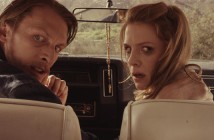
Editor’s Note: The following review is part of our coverage of TIFF’s winter film series On the Road: The Films of Wim Wenders. For more information, visit tiff.net and follow TIFF on Twitter at @TIFF_NET.
Announcing its cinematic intentions in the first frames, the third and final installment of Wim Wenders’ “Road Movie Trilogy” (a series of films that started with Alice in the Cities in 1974 and continued with The Wrong Move in 1975) Kings of the Road (1976) is the work of a master filmmaker who chooses not only to work in black and white but wears it proudly to remind you that everything is deliberate in great cinema. We join a conversation between a young man and an old man as they discuss cinema’s glory days, which remain perpetually in the past despite the unending cycle of evolution and reinvention that has defined cinema from its inception. The old man wistfully laments the evolution of cinema from days when it was a communal event with live musical performances filled with immediacy and life. The death of cinema has been prophesied and lamented each time it undergoes a new evolution, but cinema never truly dies, it merely evolves and acts as an ever-renewing reflection of the times.
Wenders romanticizes the artifacts of cinema as Bruno hauls his tools of the trade across the German countryside, stopping in each village in a futile effort to keep cinema alive.
 A Volkswagen Beetle tears across a boundless countryside, its driver channeling the untamed ferocity of Neal Cassady as he maniacally drives into a lake. In that momentary lapse of self-preservation our two protagonists meet and find an answer to their unspoken pain in the eyes of the other. They operate on different frequencies, but both use the road to avoid the circumstances that brought them there. There is no past or future on the road, only the now and the temporary faces that share time with you during your self-inflicted exile. With a beaten suitcase and a few waterlogged books, “Kamikaze” joins overall-clad Bruno and they continue their journey wrapped in the comforting stasis of the road. The horrors of the real world are mere whispers in the distance, only intruding into the pair’s dreamlike existence through crumpled newspapers used by children at play.
A Volkswagen Beetle tears across a boundless countryside, its driver channeling the untamed ferocity of Neal Cassady as he maniacally drives into a lake. In that momentary lapse of self-preservation our two protagonists meet and find an answer to their unspoken pain in the eyes of the other. They operate on different frequencies, but both use the road to avoid the circumstances that brought them there. There is no past or future on the road, only the now and the temporary faces that share time with you during your self-inflicted exile. With a beaten suitcase and a few waterlogged books, “Kamikaze” joins overall-clad Bruno and they continue their journey wrapped in the comforting stasis of the road. The horrors of the real world are mere whispers in the distance, only intruding into the pair’s dreamlike existence through crumpled newspapers used by children at play.
Generations had not yet been completely alienated from one another by marketing and demographics, so the characters they meet on their journey are merely fellow passengers. Towns were still discernible from one another, some bearing charming Tudor embellishments as Gothic towers loom on the horizon, others bearing lonely Texaco stations and lazy rivers, all hiding the secret scars of wars fought mere decades before. The landscape has forgotten most of the sins of man and his destructive ambitions, but the people that occupy it still search for identity in a time of uncertainty. The camera captures the road for all its unassuming beauty and moments of occasional ugliness. A man defecating in the sand and the silent beauty of a still quarry lake are all a part of the journey; both moments honest so why should either be hidden? The sparse, naturalistic dialogue supplements these honest images and captures the loneliness that we feel even when we are among other people.
If you ever find yourself facing relationship problems with cinema, Kings of the Road will always be there to remind you why you fell in love with cinema in the first place.
Wenders romanticizes the artifacts of cinema as Bruno hauls his tools of the trade across the German countryside, stopping in each village in a futile effort to keep cinema alive. Bruno thanklessly repairs neglected projectors so that cinema gets to live another day, even if the audiences continually dwindle as they find new distractions to keep them occupied and isolated. During a brief rendezvous with a woman on the road Bruno finds himself fixing a neglected projector at the porno theater where his temporary lover works, not to impress the woman or curry favor but out of his respect for the medium. Wenders himself is a true devotee of cinema, paying homage to pre-cinema moving picture contraptions with the brief appearance of a Kinematoscope and an inspired Chaplinesque shadow play spontaneously performed for a group of captivated children. The art of motion and light has taken many forms, but the magic that captures the imagination and offers us a temporary reprieve from the pain of existence has been present in every incarnation.
If you ever find yourself facing relationship problems with cinema, Kings of the Road will always be there to remind you why you fell in love with cinema in the first place. The road is the perfect setting for cinema, offering an escape from the hopelessness and urgency of worldly matters as the clouds drift lazily across boundless skies like whispered details of forgotten dreams. Both cinema and the road are about savoring the journey, a temporary refuge from the sins of the past as you move forward and try to take in as much beauty as possible so your soul might heal before you reach your inevitable destination. It’s in the grand expanses that live between that first travelled mile and first frame of film pulled through the sprockets and the final reel and final stretch of road before you have to go home where the dreamer can truly let go.
Kings of the Road is a beautiful, moving film by Wim Wenders, a true devotee paying homage to the magic of cinema. For fellow devotees, Kings of the Road will always be here to remind you of why you fell in love with cinema in the first place.



